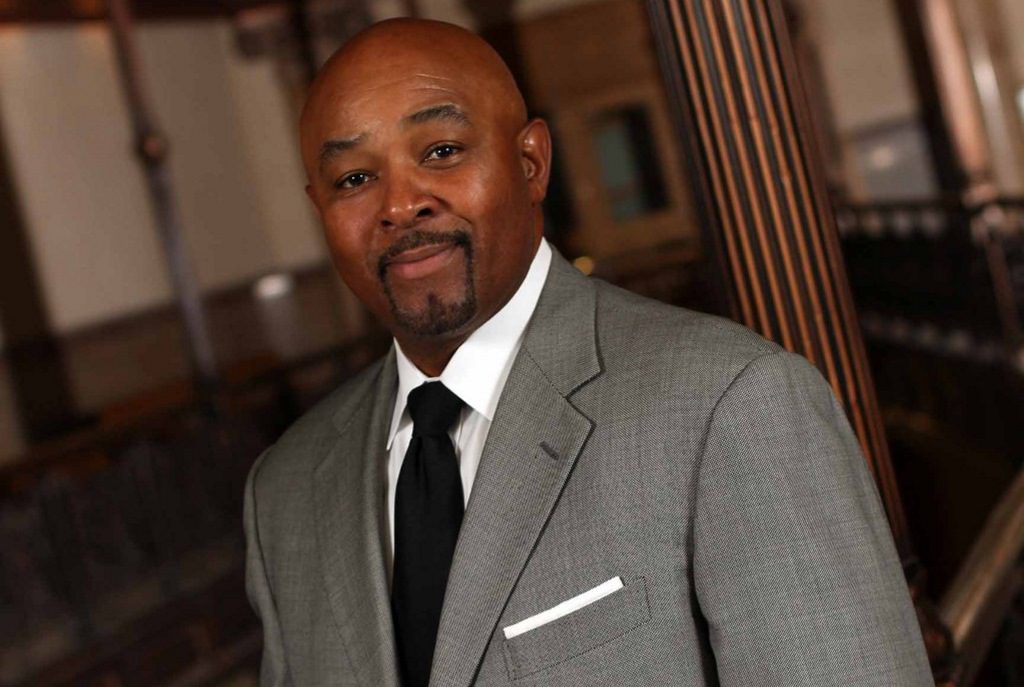New DNR Head Has Agenda of Change
Climate change, lead laterals and CAFO-polluted private wells are top concerns.
He’s been the state’s chief environmental advocate for only seven months, but Preston Cole wants big changes.
In a WisconsinEye interview, Cole called for action to confront groundwater contamination, replace lead-lined pipes that bring water to homes in 130 communities, a return to science-based decisions, and for Wisconsin to lead on handling climate change.
A former Milwaukee city official with a college degree in forestry management, Cole is running DNR while he waits on the state Senate to confirm him. Democratic Gov. Tony Evers tapped him to run DNR, but former Republican Gov. Scott Walker appointed him to DNR’s governing board in 2007.
Cole called groundwater contamination Wisconsin’s “number one” environmental and public health problem.
“People are worried,” he said. “About 1.7 million people get their water from 800,000 private wells.
“Individuals using private wells aren’t testing their wells. Only about 10 percent [of private wells] are being tested annually. That’s worrisome.
“I implore [private well owners]: Do whatever they have to do to test their well water on an annual basis. There’s a lot at stake with regard to public health.”
With nitrates, arsenic and other contaminants that couldn’t be measured only a few years ago – the industrial byproduct PFA, which is increasingly being found in groundwater in northeast Wisconsin, for example – there is “way too much at stake.”
“You want to know what’s in your water,” he said. “You have to know what’s in your water. We don’t like what we’re finding.”
Cole praised the state Department of Health Services for setting a new standard – 20 parts per trillion – for PFAs. That’s equal to four drops of PFA in an Olympic-sized pool — “but those four drops will do harm to anybody,” Cole added. It’s also lower than the U.S. Environmental Protection Agency (EPA) standard of 70 parts per trillion.
Concentrated animal feeding operations, or CAFOs, are another concern of Cole’s. He noted that over the last eight years, 110 new, huge commercial farms were begun in Wisconsin and about two-thirds of them were located in only two or three northeast Wisconsin counties where tests have confirmed increasing groundwater contamination.
Allowing that number of CAFOs in one region failed the “common sense” test, because soil and rock formations in that area “leak like a sieve,” Cole added.
Although legislators considered moving regulation of CAFOs from DNR to the state Department of Agriculture, Trade and Consumer Protection, Cole said EPA expects his agency to continue to regulate them.
DNR will hire four more scientists — “more eyes and ears” — to focus on CAFOs, Cole added.
Reversing a Walker Administration policy, Cole also said DNR scientists will present their findings on these important issues to legislators. “We will give legislators the science behind what they are debating,” Cole vowed.
On the issue of lead laterals connected to homes in cities like Milwaukee, Evers recommended borrowing $40 million to help homeowners statewide replace water lines in some 130 municipalities in the state.
Republican legislators killed that plan, however.
One Republican, Rep. David Steffen, said Green Bay replaced all its lead-lined laterals without relying on state help. Milwaukee and leaders of other cities should follow that example, Steffen added.
But Cole said lead is especially harmful to children under six and pregnant women.
Although there are 77,000 lead laterals just in Milwaukee, Cole said, “This is not a Milwaukee issue [or] Madison issue. This is a statewide issue. This is a crisis. Government has to step in.”
On the issue of climate change, Cole said: “It’s real.”
“Scientists are seeing extremes that we haven’t seen, as it relates to the environment, and it’s all man-made.”
But what can Wisconsin do to fight a worldwide problem?
“Lead.” Wisconsin must make land-use and infrastructure changes to confront heat waves and more violent storms that bring flood waters laced with toxic chemicals, he added.
Scientists warn that climate change could bring Wisconsin 38 days with temperatures above 90 degrees by 2050, and more than 100 days with those heat waves by 2100, Cole said. That would destroy Wisconsin’s “ecosystem,” Cole said.
“It’s going to put our economy upside down.”
Steven Walters is a senior producer with the nonprofit public affairs channel WisconsinEye. Contact him at stevenscotwalters@gmail.com
More about the Lead Crisis
- Rep. Madison Proposes Restoring Local Control Over Lead Inspections - State Rep. Darrin Madison - Jan 6th, 2026
- $43 Million Later, MPS Says Classrooms Are Safe From Lead Dust - Corrinne Hess - Dec 18th, 2025
- MPS Buildings Cleared of Lead-Paint Risks after 10-Plus Months of Work - Milwaukee Public Schools - Dec 17th, 2025
- Wisconsin Moves to Require Lead Service Lines Replaced By 2037 - Danielle Kaeding - Dec 11th, 2025
- Gov. Evers, DNR Announce More Than $159 Million to Ensure Clean, Safe Drinking Water for Wisconsinites in 29 Municipalities - Gov. Tony Evers - Dec 10th, 2025
- EPA Announces $3 Billion in New Funding for States to Reduce Lead in Drinking Water - U.S. Environmental Protection Agency - Nov 25th, 2025
- Wisconsin Communities Get $282 Million for Drinking Water Projects - Danielle Kaeding - Nov 19th, 2025
- MKE County: County Launches Lead Abatement Program - Graham Kilmer - Nov 9th, 2025
- Milwaukee County Launches Lead Remediation Program to Reduce Lead-Based Paint Hazards in Homes in Suburban Communities - David Crowley - Nov 5th, 2025
- Wisconsin Improves Child Lead Testing Rates, Urges Continued Testing and At-Home Prevention - Wisconsin Department of Health Services - Oct 21st, 2025
Read more about Lead Crisis here
The State of Politics
-
A Wisconsin Political Trivia Quiz
 Dec 15th, 2025 by Steven Walters
Dec 15th, 2025 by Steven Walters
-
The Fight Over Wisconsin’s House Districts
 Dec 8th, 2025 by Steven Walters
Dec 8th, 2025 by Steven Walters
-
The Battle Over On-Line Betting
 Nov 24th, 2025 by Steven Walters
Nov 24th, 2025 by Steven Walters





















Allowing more CAFOs not only contributes to environmental problems, but also contributes to the dairy crisis at a time when supply exceeds demand. One example where bad environmental policy is also bad economic policy.
It sounds like Cole was a good choice.